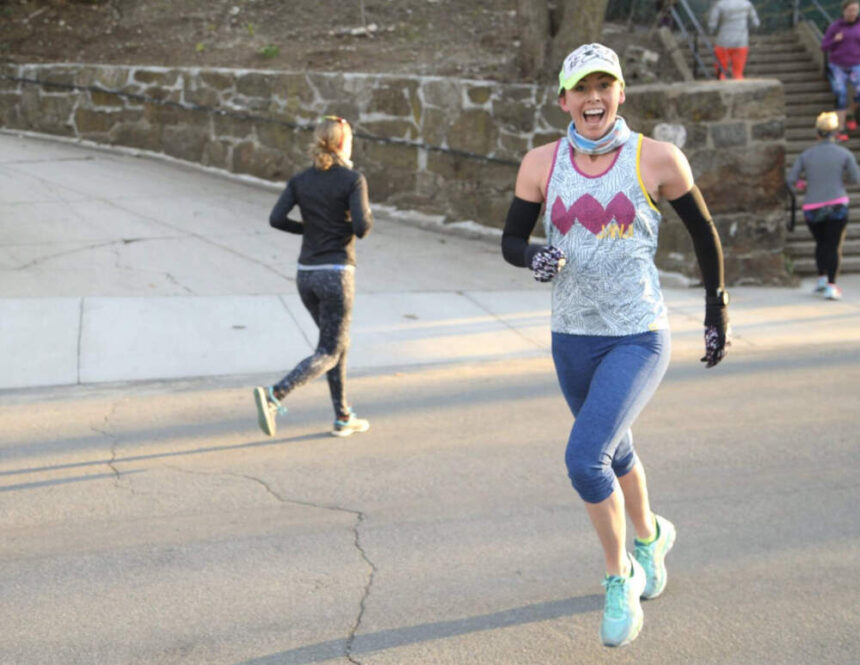Editor’s note: Laura Green makes a living mocking something she’s spent most of her life being pretty intense about — running. Green grew up in a family of runners and she, along with three of her four siblings, was a Division 1 runner in college. She graduated from Northeastern with a doctorate in physical therapy and worked with geriatric patients for more than a decade before quitting her stable but “tragically repetitive” job to become a comedic content creator about 18 months ago. Green shares her comedic work — including the videos brands pay her to script, storyboard and film — on Instagram, TikTok and YouTube.
Runners are known for taking themselves pretty seriously, which makes Green’s ability to laugh at the sport — and herself — very refreshing. Her humor resonates with professionals and Olympians (like Molly Seidel and Alexi Pappas, who have appeared in Green’s skits) as well as back-of-the pack, recreational runners like me.
“You guys ever thought about how we’re out here, just literally like running around?” Green asked in one of her earliest skits. “Some people leave their house and they run around away from their house, and then then run around back. Some people run around in little circles. Some people love to love to go runnin’ around in the woods. What are we doing?!”
Green’s goal is to help runners of all ability levels feel more connected to the sport by demystifying the jargon, humanizing the legends and sharing a good belly laugh. This piece, which has been edited for length and clarity, was excerpted from an interview. — Kate Neale Cooper
I was working as a physical therapist but wanted to also do something creative so I started this business called Folktale Film to fill a creative void. I would interview people about their lives, ask them for tours of their homes to enhance the storytelling, and add their old photos to the film. Then I’d create these two-hour movies they could have as keepsakes for their kids and grandkids. It was super meaningful and I loved it so much, but it was a ton of work. And I got burned out.
My friend Sasha was visiting from Colorado and she said, “Why don’t you put yourself in front of the camera for once?” My response was something like “Absolutely not.” But she challenged me to make just one video where I was the main character. And I did it. It was about the pregnant runner’s expectation about what it will be like to run with her kid in a jogging stroller.
That one took off and then I did one about taking your road running friend trail running for the first time.
Those first two did so well and I was shocked. But what I was more shocked by was the fact that I didn’t care about how ridiculous I looked. That was very eye-opening. I think a shift happened in my early 30s, when I became a mom. I started to outgrow all the insecurities of my 20s. I just became much more mature and secure in who I was.
These days I’m much more concerned with the jokes being funny and accurate than how I look on camera. And that shows.
It’s difficult to make friends as an adult. It just is. And in this post-COVID life that we’re all living, I think we all still are pretty traumatized and a bit guarded when it comes to venturing out and trying new things. And the thing that we all know very well at this point is the internet. It’s sad, right? But it’s not all bad.
Making friends is easier when you have similar hobbies. So running is this gateway and I want to make everyone feel like they’re in on the joke. So whether you’re a newbie runner or a pro, you can kind of relate to most of my skits in some way. People appreciate that feeling of belonging — and it’s interesting to find that on the internet.
Making friends is easier when you have similar hobbies. So running is this gateway and I want to make everyone feel like they’re in on the joke.
There are a lot of runners out there who don’t have running friends. They have entered this space alone and they want to keep going, but it’s hard to continue anything without a community.
And I may be a silly little influencer who makes stupid videos, but those videos make people feel more connected to this thing that they’re super passionate about, if I can keep people going, then that’s a job well done. And that’s an unexpected bonus that I did not see coming.
—–
I think one of the things that people appreciate is when I set a boundary and I’m vocal about that boundary. For instance, I won’t put my family on the internet
I’m pregnant now. It’s my third pregnancy, but it’s my first pregnancy on the internet. It’s my first time being pregnant in your phone. And one of my biggest worries about coming out and saying that I was pregnant, was people feeling the need to comment, “You look really small still,” or “What do you have, twins in there?” I don’t ever want people who are reading the comments on my reel feel insecure about their own pregnant body. So you can ask personal questions about me and my uterus all you want, but I’m not always going to answer them.
It’s not good for my mental health — and I have thick skin. But what if someone who follows me and has thinner skin reads it and feels bad about themselves, about their pregnant body, about their running pace or mileage — nope. I’m not going to have that.
I delete comments that make this space unsafe or unwelcoming for other people. Protecting people who just come here for a laugh or hoping to feel included is my first priority. I’m also very happy to block people. I don’t have to do it very often, but I will. I have every right to keep my page exactly the way I want it to be.
There’s no room in my corner of the internet for negativity.
—–
The reason that I’m still so active in running is because I’m such a fan of professional running. It’s a sport that’s incredibly popular around the world, but in the U.S. it still needs so much help. And so I’m just trying to stoke the flame. I want recreational runners to be invested in the stories and personalities of these professional athletes, especially the women. When they see these runners pop up on their “for you” page or on their TV, my hope is that they remember a skit I did with that pro and start cheering for their success because they feel like a friend, not an untouchable, robotic specimen who runs fast.
Think about it: When you run the New York City Marathon, you start at the same spot where the professionals do. You run the same route. You finish in the same spot. They just do it a lot faster. No other sport can say that and it’s so cool.
I have to give my friend Bojan Mandaric credit for my catchphrase, “No one cares.” Bojan is Serbian, so English wasn’t his first language. He didn’t speak English until he came to college when he was 19. He’s really smart and he learned the language quickly, but there are still times when says things that may seem out of context. And the origin story of this catchphrase is a perfect example.
I was running Boston six and a half months after giving birth to my first son. I get nervous talking about that because it’s not something that I would necessarily recommend other people doing. But for me, the base was pretty much there and the training was very good for my mental health. I was in good shape, but also knew that I wasn’t going to PR. I was just running for my own sanity.
When people would ask me about my goal time for that race, I would say, “I don’t have one.” And I was really trying to get that across. This is way before my content creation days, but because I had been a collegiate runner and because I was affiliated with November Project, I knew people were watching to see how I’d do. And Bojan knows how competitive I can be.
So I ran the first like 15 miles really well. And then, as predicted, I hit the wall. So I got to the top of the Newton Hills and there’s Bojan. I stopped for a minute just to talk to him cause at this point in the race, I’m done. He hugs me and he quietly says, “No one cares. No one cares. No one cares.” And I was like, “What the f—? No one cares? Seriously, no one cares about this huge accomplishment?”
But as I kept running, I translated it from Bojan. And I was like, “Oh, I know exactly what he’s trying to say.” He’s saying that nobody cares that your time is a solid 40 minutes slower than you have run before. And no one cares about the outcome. They’re just very happy to see you out here and you look good and you look comfortable and healthy.
Remembering that no one cares about my performance after that first kid — and then the second — really helped me kind of age through my thirties and quiet my competitive brain.
I think the idea that “no one cares” especially resonates with millennials because we grew up on this idea that our accomplishments define our worth.
Facebook was started my freshman year of college at Northeastern. And remember, in the beginning, it was just for college kids and the Boston schools were the first schools on Facebook and you had to have one of those coveted email addresses to have an account.
We started putting our successes out there on the internet from the time we were 18. We made highlight reels of our lives. “Look, I graduated college with honors.” “Look, I’m an All-American.” “Look, I got my dream job.” (Just kidding — no one could get a job, it was 2008.)
And then all of a sudden we were 35. We’re slowing down a little bit because it’s harder to train. We’ve got too much going on. We’re so used to sharing the highs. But the truth is that no one’s paying attention.
We’re all wrapped up in our own worlds. Of course, that should not stop you from going for it — whatever “it” is. Whether that’s a local 5K or your dream job.
And if you don’t get it, don’t worry. We’re not paying attention to you. We’re all too self-involved.











